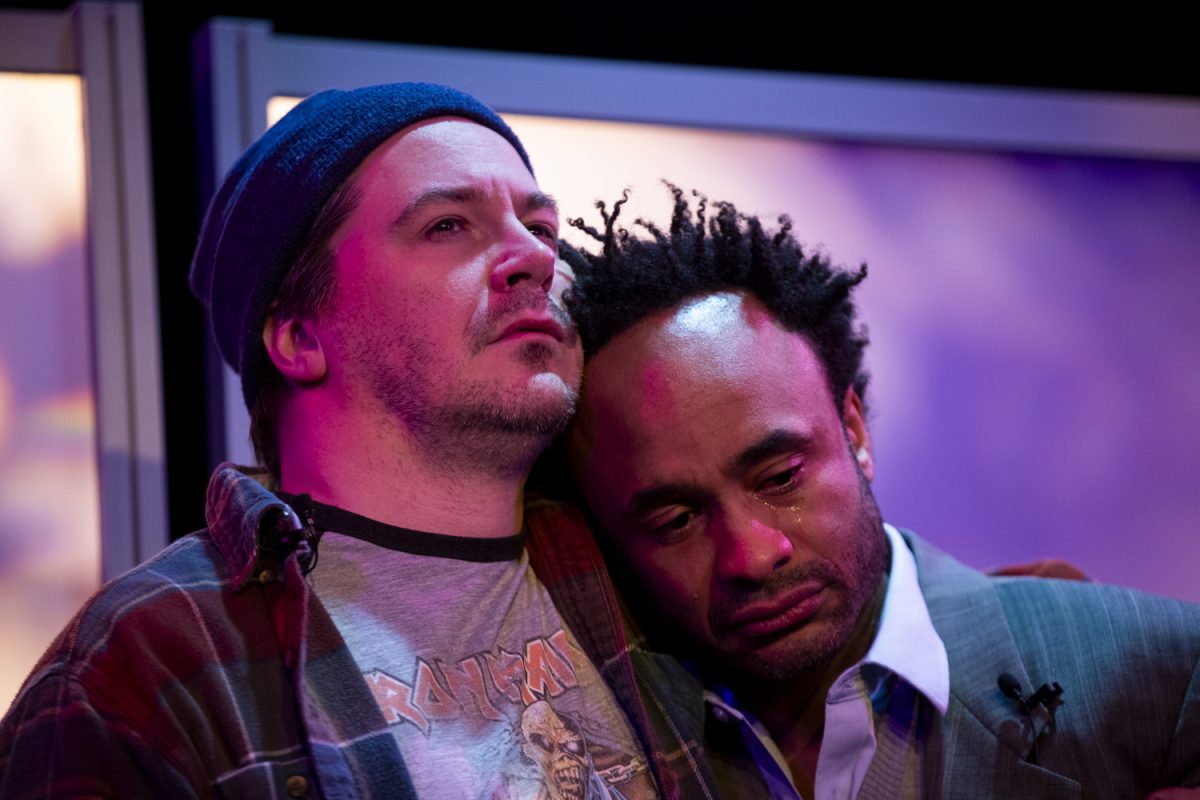Riverside Theatre successfully brought another tremendous and professional play to its venue on Jan. 19.
Despite the threat of negative windchill on the opening night for “A Case for the Existence of God,” a play by the award-winning writer of “The Whale” and Iowa Playwrights Workshop alum Samuel D. Hunter, a sizable audience managed to trudge through the snow for the highly anticipated reception at Riverside Theatre in Iowa City. The play will remain at Riverside until Feb. 4.
The Wilson Family Stage was decorated to resemble the drab office cubicle of a mortgage broker’s office but used no more than a third of the space taken up by previous Riverside productions.
The set is as minimalist as possible, decorated only with a computer, a file cabinet, a trash can, and two chairs for the lead performers.
While the blank set made it challenging for the audience to immediately get engaged, the decision is intentional. It forces the actors and the overall direction of the show to be orchestrated by subtle yet deliberate body language, said Adam Knight, the producing artistic director of Riverside Theatre.
“There is a stage direction in the script where it says the actors don’t get out of their seats unless specified, so that does present a lot of limitations,” Knight said. “But it makes me as a director think about what I don’t need. We can just let the relationship and the interaction do the work.”
Audience members were able to immerse themselves in the gritty realism of the play’s two characters, Keith and Ryan, and saw the true emotional payoff by the end of the performance.
Keith, played by local actor Barrington Vaxter, offered an aching look into the mind of a father fighting to keep his adopted daughter out of the hands of her biological family.
Vaxter made his performance extremely believable, allowing viewers to develop a connection to him and his daughter, though she is never physically seen in the play. His delivery of each line and ability to produce real tears truly drove home his performance as a father fearful of losing his child.
Chicago-based actor Scot West, the counterpart to this piece, embodied Ryan, a man fighting a similar custody battle for his own daughter. West upheld his half of the play, delivering his lines in a staggeringly beautiful way that felt truly representative of fatherhood.
These two characters share a “same sadness,” to quote the play, contemplating the questions and worries each generation has felt with their children; something that always exists within the innate parental subconscious.
“Watching [Keith and Ryan] bond over potentially losing their kids was like watching a war. It would certainly feel like a war, having your child taken from you,” one audience member said.
The basis of this fear is used to accelerate the plot, acting as another aspect of the play that invests its audience in these ultra-realistic characters’ lives.
Sequentially, the play manages to glide through time, almost giving viewers the highlights of the lives of these two men.
“Time and space within the play have an exciting fluidity that is uniquely theatrical. We jump forward in time very instantaneously and it’s almost like Sam [D. Hunter] is stripping away these unneeded moments and is presenting the play as one continuous motion,” Knight said about his directorial process.
The structure of this production feels most comparable to a domino effect, meticulously setting up domino after domino until finally knocking them all down; the first hour of the play felt like one massive inhale, with everyone waiting for their cue to release.
Once the exhale was finally offered, it destroyed every predetermined aspect of the play, depicting the most visceral and human reaction one could possibly have in a fight for their child.
Barring this examination of the plot trajectory, the play is clearly meant to illuminate the harsh realities of simply being human and the silver lining that can be found within our hardships.
The title, “A Case for the Existence of God” feels especially peculiar after the viewing, as there is little to no back and forth about religion or faith, yet the whole concept manages to have these ideas fused into them without needing mention or intense contemplation.
“God” is never mentioned in the play, yet acts as the prevalent source of inquisition for the story: Are we our own God, and are these men theirs?
The play leaves viewers contemplating God while never having to explicitly say a word about it. The absence of “God” within a piece where the word is in the title spoke to a lack of confidence in a higher power.
The response from the audience for Hunter’s “A Case for the Existence of God” on opening night is a testament to the love of theater that Iowa City has and showcases the success of great minimalist writing by a UI graduate.



